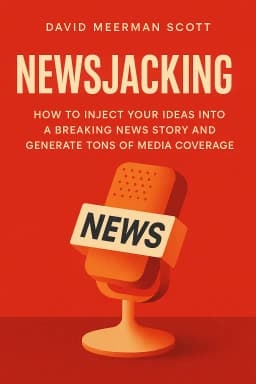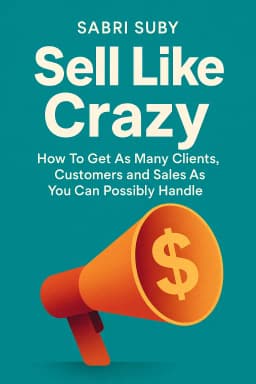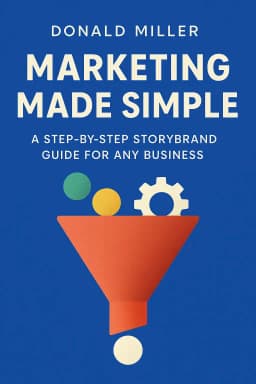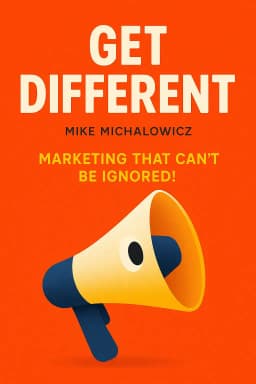
Hijacking the Headlines
Golden Hook & Introduction
SECTION
Olivia: What if I told you that 33 pairs of sunglasses, given away for free, generated an estimated forty-one million dollars in media exposure? Jackson: Hold on, forty-one million? With an M? That can't be right. That sounds like a marketing fairytale. What, did they have diamonds in them? Olivia: Not a single diamond. It’s a masterclass in a strategy so powerful, it can hijack the global news cycle. And that incredible story comes from the book we're diving into today: Newsjacking: How to Inject Your Ideas into a Breaking News Story and Generate Tons of Media Coverage by David Meerman Scott. Jackson: And Scott is the perfect person to write this. He literally coined the term 'newsjacking.' He's been at the forefront of this shift to real-time marketing for decades, long before it was the norm. Olivia: Exactly. He saw that the old rules of PR—slow, controlled press releases—were dead and buried. The internet created this chaotic, real-time news environment, and he essentially wrote the playbook for how to thrive in it. He argues that speed and agility now beat size and budget, every single time. Jackson: So it’s a David vs. Goliath playbook. I like that. So, let's start with that forty-one-million-dollar story. How on earth did that happen?
The Art of the Ambush: What is Newsjacking?
SECTION
Olivia: It’s one of the most brilliant examples of newsjacking ever. The year is 2010, and the world is captivated by the story of 33 Chilean miners trapped nearly half a mile underground. For 69 days, they were in near-total darkness. The rescue itself was a massive global media event. Cameras from every major network were pointed at the mouth of that mine. Jackson: I remember this. It was all anyone could talk about. The whole world was holding its breath. Olivia: And someone at Oakley, the sunglasses company, was paying very close attention. They realized something simple and profound: after more than two months in darkness, the miners' eyes would be incredibly sensitive to the bright Chilean sun. They needed serious protection. So Oakley acted. They arranged to have 33 pairs of their high-end Radar sunglasses, with special protective lenses, delivered to the rescue site. Jackson: Wow. So it wasn't just a marketing stunt. It was actually a genuinely helpful act. Olivia: That’s the genius of it. It was both. As each miner was brought to the surface, one by one, they were immediately handed a pair of these very distinct, very recognizable Oakley sunglasses. The images were broadcast live, globally. Every photo, every news clip, every front page featured these miners, these heroes, wearing Oakleys. The company didn't issue a press release saying, "Look how great we are." They just solved a problem in the middle of a breaking news story. Jackson: And the result was forty-one million dollars in equivalent media value. That is absolutely staggering. It’s the perfect feel-good story of newsjacking. But I have to ask, does it always have to be so... noble? Olivia: That’s the perfect question. And the answer is a hard no. The book gives other examples that are far more opportunistic. Take the time Paris Hilton was arrested in Las Vegas. Jackson: Oh, I can see where this is going. Olivia: The story was everywhere. As it broke, Wynn Resorts, a major competitor to the Hilton hotel family, immediately announced that Paris Hilton was permanently banned from all Wynn properties in Las Vegas. Jackson: Ouch. That feels a bit like kicking someone when they're down for a quick press hit, doesn't it? It’s a little... vulture-like. Olivia: It’s definitely aggressive. But it worked. Over 5,000 news stories about Hilton's arrest also mentioned that she was banned from Wynn Resorts. Wynn inserted their brand name directly into a massive celebrity news cycle, for free. It’s a textbook newsjack, even if it feels a little sharp-elbowed. Jackson: Okay, so on one hand you have Oakley being the helpful hero, and on the other you have Wynn playing the ruthless rival. It seems like this technique has a real moral ambiguity to it. Olivia: It absolutely does, and we'll get to the dangers of that. But what both stories have in common is that they understood what journalists needed in that exact moment. And that gets to the core of Scott's method. It's not just about crashing the party.
The Newsjacker's Goal: Owning the Second Paragraph
SECTION
Jackson: What do you mean? It seems like it’s all about crashing the party. Olivia: Scott argues that the newsjacker's real, secret goal is to "own the second paragraph." Jackson: Wait, 'own the second paragraph'? What does that actually mean for a journalist who's just trying to file a story on a deadline? Olivia: Think about how a news story is built. The first paragraph is always the "what." It's the basic facts: Who, What, When, Where. A fire broke out. A celebrity was arrested. Miners were rescued. But the story can't end there. The journalist is under immense pressure to find the next part of the story: the "why," the "what does this mean," the "what happens next." That's the second paragraph and beyond. It’s the context, the analysis, the implication. Jackson: Ah, so the newsjacker's job is to provide that context. You're not just shouting your own name; you're handing the reporter a crucial piece of their story on a silver platter. Olivia: Precisely! You're adding value to their report. The best example of this in the book is the London Fire Brigade. In 2011, a fire broke out at Richard Branson's private island retreat. The actress Kate Winslet was there and famously helped carry Branson's 90-year-old mother to safety. Jackson: Another story I remember well. Winslet was hailed as a hero. Olivia: She was. And the London Fire Brigade saw the news breaking. Within hours, they published a post on their own website with a brilliant headline: "Kate Winslet offered firefighter training after daring island escape." Jackson: That’s clever. It’s fun, it’s timely. Olivia: But here's the genius part. The story wasn't just a gimmick. They used the offer to seamlessly embed three critical fire safety messages into their post: have a working smoke alarm, plan your escape route, and once you're out, stay out and call for help. Jackson: I see it now! The media, who were all writing the same basic story about Kate Winslet the hero, suddenly had a new angle. They had a second paragraph. The London Fire Brigade's offer, and more importantly their safety messages, were reported by news outlets worldwide. They newsjacked a celebrity story to deliver a life-saving public service announcement. Olivia: Exactly. They didn't just crash the party; as you said, they showed up with the one thing the host forgot. They added immense value. And that's the key. You have to be monitoring the news, using tools like Twitter and tracking hashtags, and you have to be ready to move in an instant. The window of opportunity is incredibly fleeting. Jackson: Okay, so you need to be fast, and you need to add value. It sounds simple enough. But if you're moving that fast, it feels like it would be incredibly easy to make a catastrophic mistake.
The Tightrope Walk: The Power and Peril of Newsjacking
SECTION
Olivia: You are absolutely right. As Scott warns throughout the book, this is a high-wire act. Speed without judgment is a recipe for absolute disaster, and the fall is brutal. Jackson: I'm guessing he has an example of someone falling off that high wire? Olivia: He has the ultimate example. The fashion designer Kenneth Cole during the 2011 Egyptian revolution. Protests were raging in Cairo, and the hashtag #Cairo was trending globally as people shared news from the ground. In the middle of this political and social upheaval, the official Kenneth Cole account tweeted, and I quote: "Millions are in uproar in #Cairo. Rumor is they heard our new spring collection is now available online." Jackson: Oof. No. That is physically painful to hear. It's so tone-deaf it's almost impressive. Olivia: The backlash was immediate and furious. It was a textbook case of what not to do. It was purely self-serving, it added zero value, and it trivialized a serious and dangerous situation. It was a newsjacking attempt that became the news for all the wrong reasons. Jackson: That’s a career-ending-level mistake. And in today's cancel culture, that would be a thousand times worse. So is the lesson just... don't be a self-serving jerk? Or is there a more nuanced rule here? Olivia: The rule is to be dignified, add value, and be sensitive. But then Scott introduces a character who seems to exist just to break all the rules: the "master newsjacker," Larry Flynt, the publisher of Hustler magazine. Jackson: Oh boy. This should be interesting. Olivia: Flynt is fearless. When Congressman Anthony Weiner resigned after his sexting scandal, Flynt publicly offered him a high-paying job. When Abercrombie & Fitch offered to pay "The Situation" from the TV show Jersey Shore to stop wearing their clothes, Flynt publicly offered him money to wear Hustler-branded clothing. Jackson: So he's basically a professional troll. He just dives into the messiest, most controversial stories with a provocative offer that he knows the media can't resist covering. Olivia: That's his entire model. He's not adding value in the way the London Fire Brigade did. He's adding spectacle. He's exposing hypocrisy and promoting his own brand of free speech, and he does it by being utterly fearless. He proves that sometimes, even harsh, distasteful newsjacking can be incredibly effective at getting attention. Jackson: That really complicates the picture. It feels like there are no hard and fast rules, just a massive gray area and a lot of risk.
Synthesis & Takeaways
SECTION
Olivia: There are. And that’s the central tension of the book. It’s not a safe, predictable marketing strategy. It’s an opportunistic art form that requires speed, wit, and a huge amount of judgment. Jackson: So what I'm hearing is that newsjacking is this incredibly powerful tool, almost like a lightsaber. In the right hands, like the London Fire Brigade, it can be a genuine force for good. In clumsy hands, like Kenneth Cole, you cut your own leg off. And in the hands of someone like Larry Flynt... it's just chaos, but you can't look away. Olivia: That's a perfect summary. And Scott's ultimate point, the reason this is so important, is that in today's media world, you can't afford to ignore this. The rules have changed whether you like it or not. Even if you don't want to newsjack, you have to understand how it works, because someone is getting ready to newsjack you. Jackson: That’s a chilling thought. Your competitor, a disgruntled customer, an activist... anyone can hijack your story if you're not prepared. Olivia: Exactly. And so the question he leaves us with is this: when that moment comes, when a story breaks that involves you or your industry, will you be ready to respond? Will you have the mandate and the agility to shape the narrative, or will you be watching someone else write it for you? Jackson: That's a powerful thought to end on. We'd love to hear from our listeners. Have you seen a brilliant—or a truly terrible—example of newsjacking out in the wild recently? Let us know on our social channels. We're always curious to see who's walking the tightrope. Olivia: This is Aibrary, signing off.









